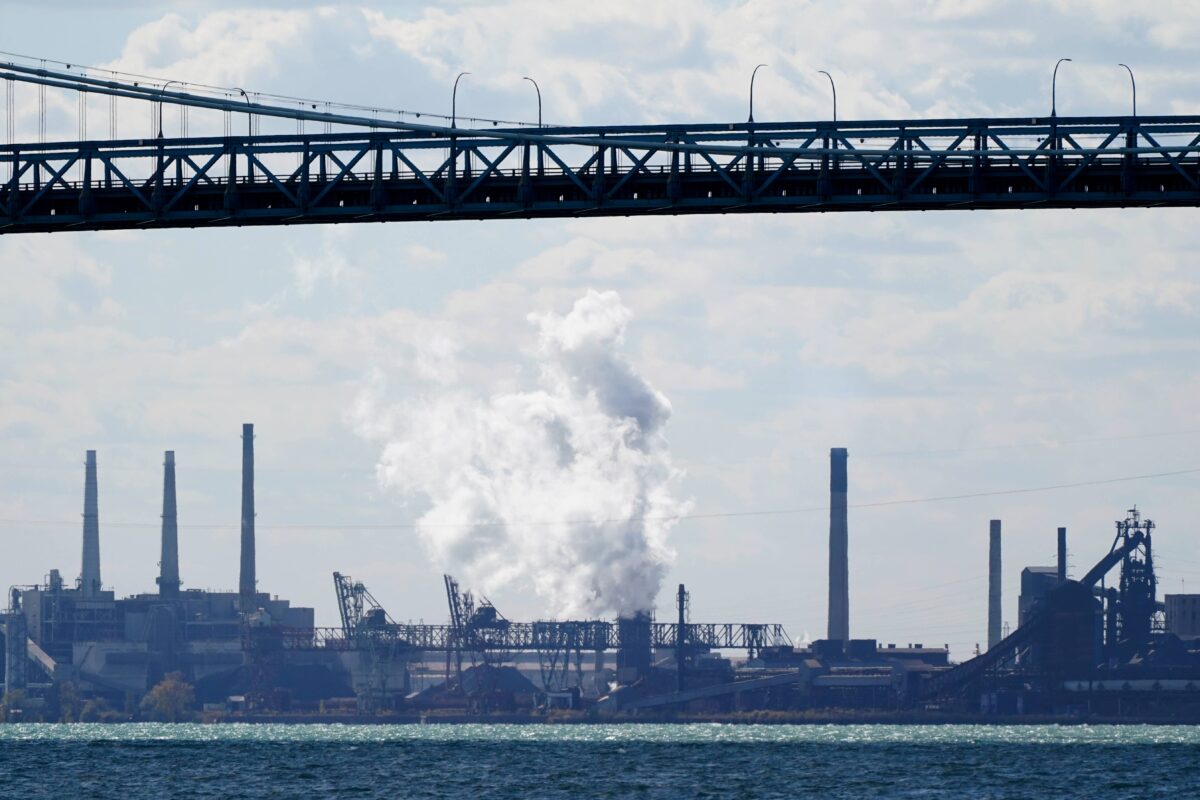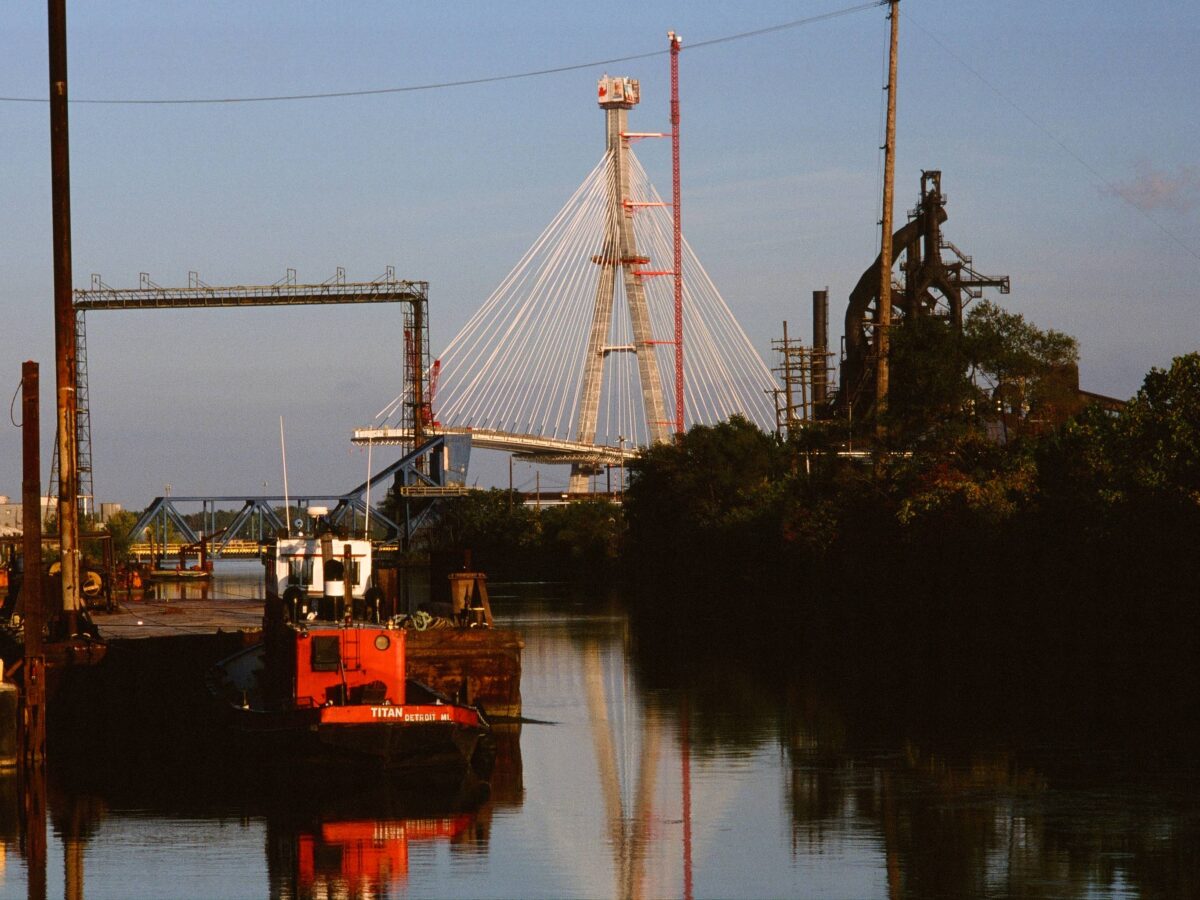Overview:
- A DTE Energy lawyer says the Zug Island company EES Coke Battery cannot afford to pay hundreds of millions of dollars in penalties.
- A witness in the trial says DTE Energy controls all of the Zug Island facility's cash.
- The Environmental Protection Agency filed the lawsuit over sulfur dioxide emissions from EES Coke Battery in 2022, and DTE Energy was added as a defendant last year.
This story was produced with support of Internews’ Earth Journalism Network.
The U.S. government is seeking a $140 million civil penalty against DTE Energy and its subsidiaries in a Clean Air Act lawsuit over air pollution from Zug Island, and an expert witness said Tuesday the utility can afford to pay.
DTE Energy can pay a penalty “without enduring undue financial hardship,” Dan Leistra-Jones of Industrial Economics said in testimony in a federal bench trial of the Environmental Protection Agency’s lawsuit over sulfur dioxide pollution from EES Coke Battery.
Leistra-Jones said he analyzed the utility’s financials. “I’m very comfortable opining that DTE Energy Co. can pay $77 million a year,” Leistra-Jones said. “They could easily delay capital expenditures for a year.”
Leistra-Jones calculated that DTE companies realized a total substantial economic benefit of $185 million to $226 million during EES Coke Battery’s period of noncompliance with the Clean Air Act, he said.
“The most economically rational thing to do is to break the law,” he said, adding that the utility should be penalized at least this amount.
EES Coke Battery, DTE Energy’s Zug Island subsidiary, can’t pay the amount, said Michael Hindelang, an attorney representing DTE Energy and companies under its corporate umbrella.
Leistra-Jones said EES Coke could get a loan. Based on inter-company loan agreements reviewed in court Monday, Leistra-Jones said DTE Energy controls all of EES Coke’s cash.
MORE ZUG ISLAND REPORTING
DTE Energy’s control over Zug Island subsidiary ‘unprecedented’: Expert witness
The government is seeking injunctive relief and penalties of up to $109,024 per day, per environmental violation from EES Coke Battery and DTE Energy.
Zug Island pollution lawsuit goes to trial: What it means for DTE Energy
A bench trial in the EPA’s lawsuit over EES Coke Battery’s sulfur dioxide emissions starts Monday.
DTE Energy must face Zug Island pollution litigation: Federal judge
A federal judge says there is evidence demonstrating that DTE Energy exercised control over EES Coke Battery’s emissions on Zug Island.
DTE’s corporate structure in focus on trial’s second day
DTE parent companies have a “high degree of control” over EES Coke, as shown through inter-company agreements and capital expenditures, Leistra-Jones said. Based on the corporate structure, EES Coke cannot operate without DTE, the financial analyst said.
In one example, EES Coke needed approval from DTE for a consent request form between the coke battery and Lone Star Specialties, a manufacturer of coal tar and petroleum products, Leistra-Jones said. DTE Energy Services requested approval from its board on behalf of EES Coke, and DTE Energy Services board members approved it, he said.
Financial decisions are environmental decisions, Leistra-Jones said. Inputs, like coal, and outputs, like byproducts, “have direct implication of emissions depending on the coal mix,” he said.
“Purchases of inputs are environmental decisions,” the witness said.
Coke, which is produced by heating coal in an oxygen-free environment, is a raw material in the steelmaking process.
Hindelang asked Leistra-Jones whether he believes that, if a contractor provides a chief financial officer to EES Coke, they could be considered an operator. Leistra-Jones said the entity qualifies as an operator “if they do a lot of work and make a lot of decisions.”
On Aug. 25, U.S. District Judge Gershwin Drain ruled against a motion for summary judgment by DTE Energy and said there is evidence demonstrating that DTE Energy exercised control over EES Coke Battery’s emissions on Zug Island, supporting a finding that the utility is an operator of the facility under the Clean Air Act.
Editor’s note: This story has been updated to clarify U.S. District Gershwin Drain’s Aug. 25 ruling on a motion filed by DTE Energy.
Citing case law, Drain wrote: “There is evidence demonstrating that the DTE defendants actively participated in and exercised control over the facility’s operations regarding emissions, thereby supporting a finding that they are ‘operators’ under the Clean Air Act.”





